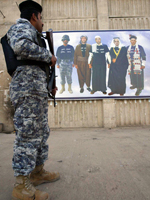On the heels of their landslide victory in the 2008 presidential election, Barack Obama and the Democratic Party will face major challenges, particularly in the Middle East, which will test the President-elect’s ability to bypass his predecessor’s disastrous policies, the worst the region has ever seen. These policies cost the United States its weight not only among its traditional foes but also among its closest allies and strained U.S.–Arab relations. The administration’s response to the 9/11 terrorist attacks in particular have worsened the situation and undermined the U.S. role as a superpower and a permanent member of the UN Security Council.
The last eight years have been particularly difficult for the Arab region of the Middle East, especially for Palestine, Iraq, and Lebanon. The region witnessed the occupation of Iraq in 2003 after the occupation of Afghanistan in 2002, the U.S.–backed Israeli aggression against Lebanon in 2006, and the ongoing siege in the Gaza Strip―not to mention the deadlock in the Palestinian–Israeli peace talks since 1999.
Not only did the peace process stall, despite the Wye River meetings and the new roadmap, but two main factors actually moved it backwards. The first is the continuing violence perpetrated by Israel, as illustrated by the Gaza siege and the building of the separation wall. The second is the U.S. administration’s abandonment of its role as an impartial peace sponsor and its unconditional support of Israel’s policies against the Palestinians.
Iraq represents another major challenge as the United States finds itself entangled in a war with no end in sight. The war led to a deterioration of the security situation and a rise in sectarian and militia violence, corruption, and bribery. This makes President-elect Obama’s promised change of policy in Iraq an even more pressing matter.
As an Iraqi intellectual and activist who lived in exile for over 25 years due to the violations of human rights in my country, I understand the importance of transforming the Middle East, a region rich in heritage, resources, and cultural diversity, into a peaceful area, without wars and aggression, and blatant violations of human rights. In order to achieve this, President-elect Obama needs to:
- Adopt a moderate policy in the Middle East, particularly in negotiations between the Israelis and the Arabs. This requires a more engaged role in peace talks, which have been shelved since the end of President Clinton’s second term. Obama needs to return to Clinton’s proposals and UN resolutions 181, 194, 242, and 338, which called for a Palestinian state with Jerusalem as its capital, the return of refugees, and an end to Jewish settlements. More urgently, Obama has to first alleviate the humanitarian crisis in Gaza by working towards lifting the siege on Gaza and allowing the free passage of civilians.
- Fulfill his promises to “end the occupation” of Iraq within sixteen months, beginning with the draw-down of troops in mid-2009. These decisions will not only affect Iraq but also the United States itself, which is in the middle of a crushing economic crisis affecting the entire world. The U.S. budget has been burdened by two unending wars and a “war on terror” waged since 2001.
These are real wars without clear boundaries that require Obama to seriously consider taking quick steps instead of continuing the same mistakes and sins.
In order to avoid creating a political, security, and military vacuum, the United States should ease the way for an interim UN takeover as it begins to pull out troops. The success of such a transition hinges on a collective pledge by the international community to protect Iraq’s sovereignty if it is violated by any external party, as well as an Arab and regional commitment to help their neighbor in its reconstruction efforts. This must be done within a global strategic plan that places Iraq on an irreversible route toward democracy, allowing for internationally supervised elections that respect human rights and restore pluralism.
For this to happen, Iraq’s debts should be forgiven and the country should be compensated for the damages it has incurred for the past few years, particularly the loss of human life, especially among experts and professionals, and the looting of archeological and historic treasures. Those responsible for human rights violations, torture, and profiteering during the rule of civilian administrator Paul Bremer and his successors should be brought to justice as well.
- Establish a balanced relationship with Syria based on dialogue and mutual interests, defuse tension in Lebanon, press Israel to respect Lebanon’s sovereignty, and forge a peace settlement that ends Israel’s occupation of Shabaa Farms and the Golan Heights. This will entail opening dialogue with Iran and including Syria in U.S. diplomacy in the region as recommended by the 2006 Baker–Hamilton Report.
As for the thorny subject of Iran’s nuclear ambitions, the issue needs patience and increased diplomatic pressure on Tehran to provide guarantees that its program is for peaceful purposes only and respects international treaties. This will be possible under the prospect of real peace in the region beginning with the resolution of the Palestinian–Israeli conflict and withdrawal from Iraq. Such developments will reflect positively on talks with Iran.
- Democratize the region―something that is urgent and central to peace and development in the Middle East. Supporting reforms, modernization, and democratization should occur within a global dialogue that stimulates a culture of democracy and diversity, respect for human rights, equality, and political pluralism, while respecting each country’s heritage and distinct national character. This issue requires greater involvement of civil society institutions in decision making and the eradication of terrorism by examining its socioeconomic root causes.
By addressing these challenges boldly, Obama will provide the region and the United States with a golden opportunity to achieve peace and defeat terrorism.
Abdel Hussein Shaban, Iraqi thinker and researcher.





